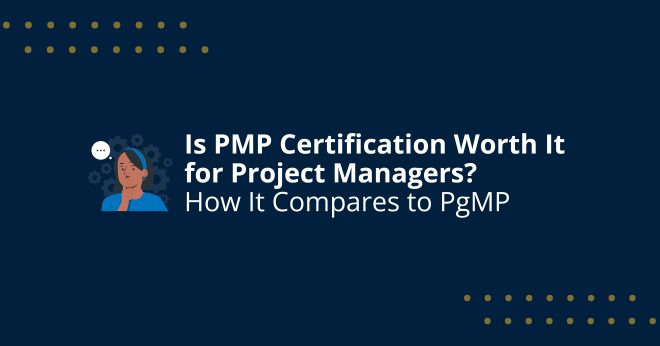
Certifications such as PMP and PgMP are international qualifications regarded as the best credentials for a professional in the present job market. These accreditations are not just certifications; they are assessments of a candidate’s understanding and leadership abilities that differentiate them from other professionals, as well as offer an opportunity to seek new job roles.
However, for project managers, is it worth it to have the PMP certification? How do they compare to each other? To make the statement clear, it is necessary to highlight the importance of the two certificates and the career objectives that an aspiring project manager intends to achieve in the future. This guide explains the value of PMP and how it is different from PgMP.
What is PMP Certification?
The PMP Certification Training Course is an advanced-level project management accreditation offered by the Project Management Institute (PMI). It enhances the skills of professionals from different fields. Moreover, this certification broadens your skill set in regard to planning, scheduling, resolving risks, and leading teams, which is nowadays a requirement for properly executing projects and the professional development of aspiring project managers. This certification is suitable for middle or senior experts and demonstrates your potential of completing projects successfully.
What is PgMP Certification?
PgMP Certification Training is crafted for professionals who manage multiple projects or interconnected programs. This certification helps to maintain alignment with project and business goals, ensuring that leaders are capable of overseeing complex, interrelated projects. The PgMP certification course is furnished with qualities such as resource allocation, reducing risks, and promoting business growth that are necessary to excel in executive-level positions.
Why PMP Certification Worth It?
Numerous advantages come with the PMP certification, which makes it unique in the industry. Here are some of the reasons why PMP certification is in high demand:
- Universal Acceptance – Having a PMP certification provides vast job opportunities for professionals, as this certification is recognised in various fields and professional networks.
- Higher Earning Potential – Based on the salary survey conducted by PMI, certified PMP professionals earn almost 20% more compared to non-certified professionals.
- Career Opportunities – Employers are aware of the tough process of achieving PMP certification, and the rigorous training professionals have undergone. This knowledge opens up greater possibilities for certified experts since employers usually prefer to hire only specialists who are certified to oversee their projects and who are prepared to handle real situations.
- Application Across Multiple Industries – The skills of a PMP professional can be utilised in different industries.
- Skills Development – The PMP certification equips candidates with the knowledge of complex techniques and best principles relevant to advanced project management.
- Networking Opportunities – By achieving PMP certification, you will get the opportunity to enter into networking opportunities provided by the global community of PMI. Being part of these networks provides informational resources and scope for collaboration.
Attending training courses to achieve PMP certification will be a valuable investment for project managers who are looking to uplift their careers.
Advantages of PMP Certification
The following advantages come to project managers after obtaining the PMP certification.
- Higher Success Rates for Projects – This certification provides you with the necessary tools and techniques required for the successful completion of a project.
- Career Growth – PMP certification leads to higher opportunities in project management in various fields.
- Enhanced Communication Skills – PMP certification provides you with the skills necessary for managing different stakeholders, which makes all projects less complicated.
- Increased Income – Based on reports, certified PMP professionals are able to earn more compared to those not certified.
PMP certification is perfect for mid-level professionals who are aiming for managerial roles.
Why Consider PgMP Certification?
When comparing PgMP to PMP, PgMP certification has unique advantages:
- Strategic Alignment – PgMP ensures a high return on investment by aligning project outputs with business objectives.
- Senior-Level Roles – PgMP certification can take professionals to senior job roles such as Project Director, Program Manager, and Director of Operations.
- Leadership Skills – The PgMP course delivers an advanced level of skills in stakeholder management and resource utilisation.
PgMP certification is suited for those who want to progress beyond project management and to program leadership roles.
Comparing PMP to PgMP. Which Certification is Right for You?
Professionals can opt for PMP certification if:
- They are handling individual projects.
- They wish to improve their project management skills.
- They are seeking mid-level growth in their careers.
Professionals can opt for PgMP certification if:
- They are handling multiple interconnected projects.
- They wish to attain leadership job roles.
- They have to align projects with business objectives.
Both PMP and PgMP certifications are valuable, but understanding the project’s nature, business objectives, and career path will be crucial in determining which certification suits your needs.
Final Thoughts
PMP and PgMP certifications are tailored for different expertise levels, but both provide extensive value to professionals and organisations. PMP targets enhancing project delivery and strengthening project management fundamentals, whereas PgMP stresses leadership and strategic alignment.
If you are trying to start or advance project management skills, opting for training courses in PMP certification will be a perfect start or first step towards your success. For experienced professionals prepared to manage programs, opting for training in PgMP certification will be a logical decision.
